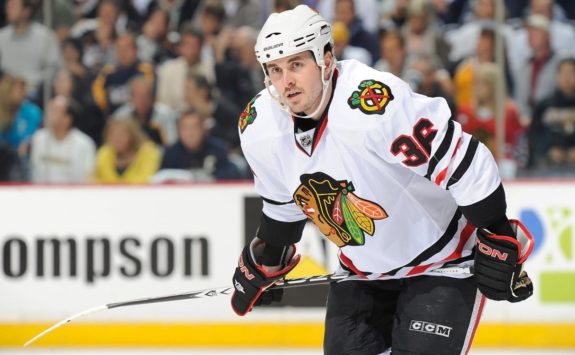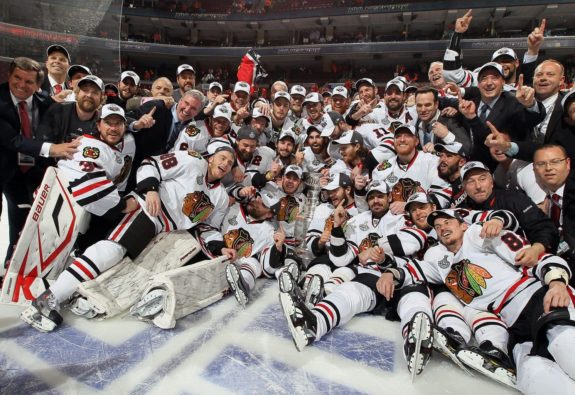
 Greg Boysen
The Hockey Writers
Greg Boysen
The Hockey Writers
54
Reads
0
Comments
Unsung Heroes of the 2010 Chicago Blackhawks
The 2010 Chicago Blackhawks will always have a special place in the hearts of their fan base. They were the team that made the franchise relevant and hockey important in the city again after years of losing and embarrassment. A decade ago, on June 9, 2010, they ushered in the golden era of Blackhawks hockey by winning the team’s first Stanley Cup in 49 years.
There was plenty of star power on the team. Captain and Conn Smythe Trophy winner Jonathan Toews was the yin to dynamic goal-scorer Patrick Kane’s yang as they formed quite the duo. Players like Dustin Byfuglien, Marian Hossa, Duncan Keith, Antti Niemi and Patrick Sharp grabbed plenty of headlines over the season, but there were a group of guys who didn’t need the spotlight and became the unsung heroes of a championship team.
Dave Bolland
Three years before “17 Seconds,” Bolland was one of the most important role players of the championship run in 2010. Injuries limited him just 39 regular-season games, where he scored six goals and 16 points. When he was on the ice, he played in all facets of the game. He was second among all forwards by averaging 1:53 of shorthanded ice time per game, while also playing 1:43, per night, on the power play.
As soon as the postseason began on April 16, 2010, Bolland flipped a switch and his play was amped up. He played in all 22 playoff games, scoring eight goals and 16 points. He played well in all three phases, scoring two power-play goals and two shorthanded goals. Bolland had the game-winning goal in the Blackhawks’ first victory of postseason versus the Nashville Predators.

Bolland was second among all forwards with 2:37 of shorthanded of ice time per game, despite leading the team with 30 penalty minutes. He became a defensive stalwart. He started 72.8% of his shifts in the defensive zone and never shied away from the tough matchups. He had 30 takeaways and was second among forward with 17 blocked shots.
“He was awesome,” Kane said of Bolland recently. “He was one of those guys who played a third-line role for like his whole time here and just really did well with it. But just the way he played, he got underneath the other team’s skin, especially their star players. Wasn’t afraid to chirp, wasn’t afraid to get into the mix, especially with his size and the way he was built.”
Troy Brouwer
Brouwer was another player who learned what his role was early in the season and accepted it. His job was to win puck battles and get it to the highly skilled forwards like Kane. However, he did his fair share of scoring with 22 goals and 40 points during the regular season. He was one of six Blackhawks to score at least 20 goals on the season. He was third on the team with seven power-play goals and his seven game-winning goals was the most on the roster.
He missed the final four games of the regular season to be with his father, who had suffered a massive stroke. He returned for the opening game of the postseason, but his minutes and production both dropped during the first round.
Brouwer was scratched for Games 3, 4 and 5 of the second round against the Vancouver Canucks. He was reinserted into the lineup for Game 6 and scored a goal in the series-clinching 5-1 victory. His biggest night of the postseason came when he had two goals and an assist in the Blackhawks’ 6-5 win over the Philadelphia Flyers, in Game 1 of the Stanley Cup Final.
He finished the postseason with four goals and eight points. While the offensive production dipped, he amped up his physical play with 51 hits, the most among all forwards and the third-most on the entire team. He still got plenty of time on the second power-play unit with 1:41 of ice time, per game, with the man advantage.
John Madden
Madden, who won a pair of Stanley Cups with the New Jersey Devils, was not brought in to wow anybody with his scoring touch and offensive prowess. He was signed by the Blackhawks to be a veteran leader for a young team on the verge of greatness. He was there to do the dirty work and the little things that every championship team needs to be done and he excelled at this role.
The veteran center scored 10 goals and 23 points in 79 regular-season games. His true value was not what he did with the puck, but what he did when he didn’t have it. He started 64.5% of shifts in the defensive zone, the highest such percentage on the team. He won 53% of his faceoffs, so a guy like Toews didn’t have to be used for each and every key defensive zone draw. His 58 blocked shots were the most among all Blackhawks forwards. He also led all forwards with 2:18 of shorthanded ice time per game.

The postseason is where Madden really proved his worth and showed why he was the Selke Trophy winner, in 2001, for being voted the league’s top defensive forward. He played in all 22 postseason games, starting a team-high 75.8% of his shifts in his own zone. He led all Blackhawks forwards with 18 blocked and 2:52 average shorthanded ice time per game while winning 51% percent of his faceoffs.
Madden came in and did exactly what he was supposed to do. He knew what his role was on this team and he ran with it. He is the definition of “unsung hero” personified.
Brent Sopel
The 2009-10 Blackhawks had quite the defensive corps, as most Stanley Cup-winning teams do. Brian Campbell was signed to a big free-agent contract in the summer of 2008 and he joined emerging stars, Keith and Brent Seabrook. Byfuglien was the breakout performer of the 2010 postseason, while Niklas Hjalmarsson was laying down the foundation for a solid NHL career.
Enter Sopel, who was a veteran of nearly 600 NHL games coming into his third season with the Blackhawks. He gladly took on the role of the third-pairing defenseman who does the dirty work within his own zone. During the regular season, he appeared in 73 games and was fourth on the team with 120 blocked shots. He was an anchor on the second penalty-kill unit, averaging 2:20 of shorthanded ice time per night.
Head coach Joel Quenneville really showed his trust in Sopel during the playoffs. His ice time went up nearly four minutes per game to 18:30. He led all Blackhawks with 3:53 of shorthanded ice time each game. He finished the playoffs tied with Hjalmarsson for the team lead in blocked shots with 54. He scored a goal in overtime Game 3 loss to the Flyers in the Final. Sopel also picked up five assists including two versus Philadelphia. He was on the ice for Kane’s overtime goal in Game 6.
“That was the tightest knit group that I’ve ever been a part of,” said Sopel recalled of the 2009-10 team. “So, the feeling of accomplishment for that group, but just the city. It comes full circle. I played my first NHL game here in Chicago (for the Canucks in 1999). To come back and see… look at the parade, two, three million people, the looks on people’s faces, the excitement on people’s faces was priceless… The whole city came together on a level I didn’t know was possible.”
Stanley Cups are not won solely by the superstars, but rather by a complete team. While every team would love to have a Wayne Gretzky and Mario Lemieux, who also need a Bolland and Madden do the little things needed to win it all.
The post Unsung Heroes of the 2010 Chicago Blackhawks appeared first on The Hockey Writers.
Popular Articles

















































 Blackhawks Chicago
Blackhawks Chicago Panthers Florida
Panthers Florida Penguins Pittsburgh
Penguins Pittsburgh Rangers New York
Rangers New York Avalanche Colorado
Avalanche Colorado Kings Los Angeles
Kings Los Angeles Maple Leafs Toronto
Maple Leafs Toronto Bruins Boston
Bruins Boston Capitals Washington
Capitals Washington Flames Calgary
Flames Calgary Oilers Edmonton
Oilers Edmonton Golden Knights Vegas
Golden Knights Vegas Flyers Philadelphia
Flyers Philadelphia Senators Ottawa
Senators Ottawa Lightning Tampa Bay
Lightning Tampa Bay Red Wings Detroit
Red Wings Detroit Islanders New York
Islanders New York Sabres Buffalo
Sabres Buffalo Devils New Jersey
Devils New Jersey Hurricanes Carolina
Hurricanes Carolina Stars Dallas
Stars Dallas Jets Winnipeg
Jets Winnipeg Blue Jackets Columbus
Blue Jackets Columbus Predators Nashville
Predators Nashville Wild Minnesota
Wild Minnesota Blues St. Louis
Blues St. Louis Mammoth Utah
Mammoth Utah Ducks Anaheim
Ducks Anaheim Sharks San Jose
Sharks San Jose Canucks Vancouver
Canucks Vancouver






